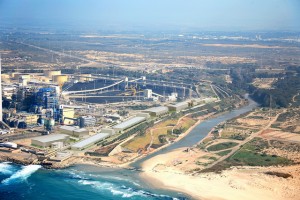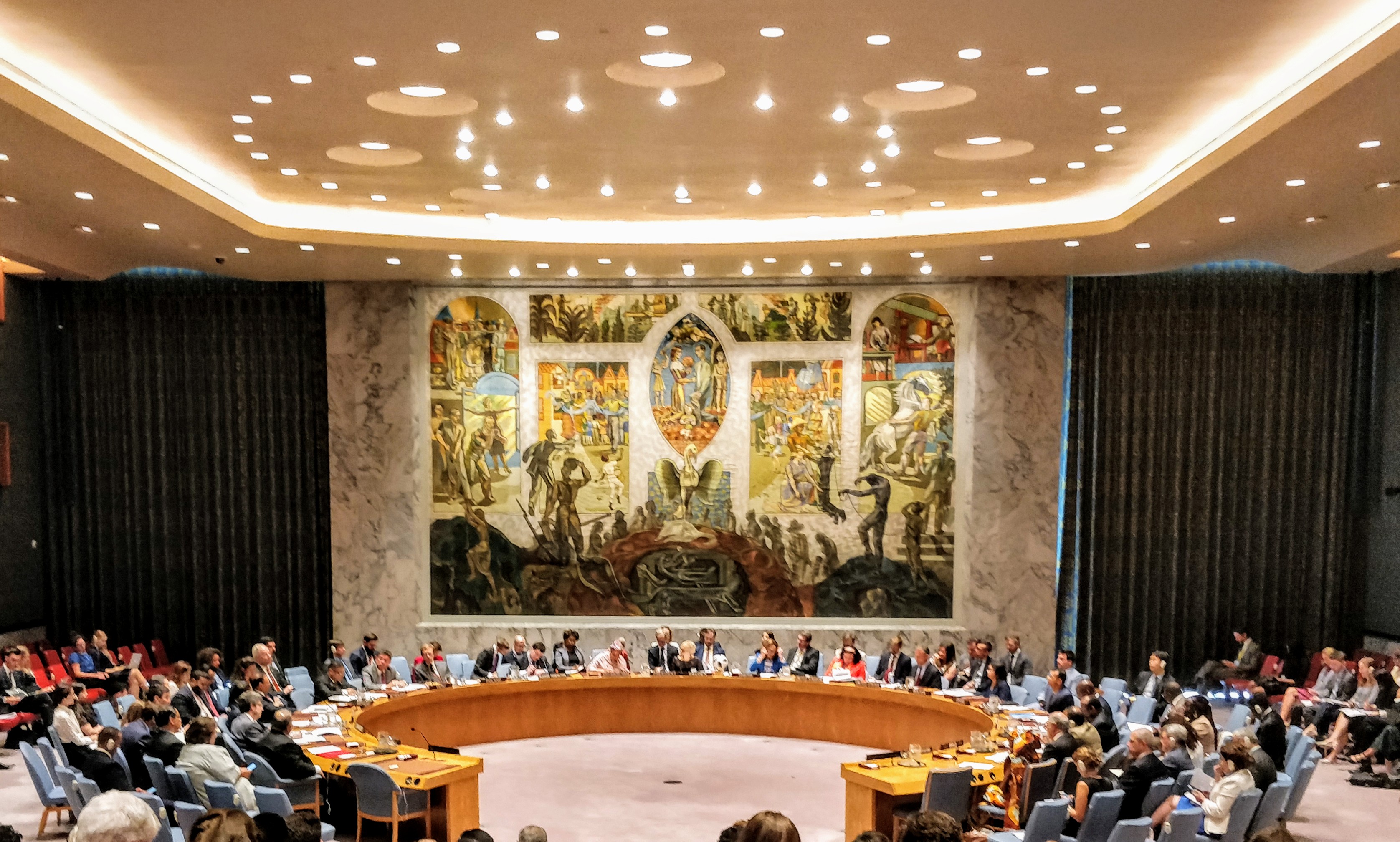By Jordana Fremed, Undergraduate Intern (Columbia College)
 Insecure water availability is a source of friction in the Middle East. One solution to adapt to water scarcity in the area is desalination, a process that turns saltwater into potable drinking water. While desalination can cause environmental impacts, the technology has provided additional water resources to a water-scarce and increasingly tense region with rising temperatures.
Insecure water availability is a source of friction in the Middle East. One solution to adapt to water scarcity in the area is desalination, a process that turns saltwater into potable drinking water. While desalination can cause environmental impacts, the technology has provided additional water resources to a water-scarce and increasingly tense region with rising temperatures.
Israel’s innovative osmosis desalination mechanism has become a vital step in adapting to decreases in freshwater as a result of rising temperature in an arid land. By 2020, the country’s average temperature is expected to rise 1.5° C in comparison to the years 1961-1990. By 2071, the Intergovernmental Panel on Climate Change anticipates as large as a 5° C increase in temperature in scenario A2, a regionalized business-as-usual path. A series of drought years since the mid-2000s caused a severe decline in both Israel’s water resources and economy [1]. More recently, temperature change in the area is expected to cause extreme occurrences like massive flooding and droughts [2].
With rising temperatures, Israel has already experienced a reduction in water availability. Water levels in the Sea of Galilee, Israel’s largest freshwater lake, have fallen as a result of evaporation due to rising temperatures and reduced precipitation. Traditionally, Israel relies on a short rainy season each winter for its water supply. However, this winter rainfall was much less than usual. This past year, water usually released from storage in April needed to be released in February due to lack of rainfall. In order to conserve water, Israel recycles about 90% of its wastewater for agricultural use, and in recent years, has constructed desalination plants to produce potable water from the sea [3].
Both water recycling and desalination are implemented by the Water Authority and Mekorot, the two main organizations in charge of executing and implementing the policies of the Ministry of Energy and Water Resources. These two organizations have successfully implemented some of the largest wastewater reuse systems in the world for agriculture, as well as various desalination projects for drinking water [4]. Israel’s water policies are guided by its Water Law of 1959, which establishes the framework for the control and protection of water resources, and grants responsibility to the Ministers of Agriculture and National Infrastructure and the Water Commissioner. The law, one of the world’s early examples of progressive legislation that protects a natural resource, nationalized all sources of water, including surface water, ground water, and sewage and runoff [5].
Given Israel’s arid climate, rising temperatures, declining freshwater availability, and large bodies of salt water, including the Red, Mediterranean, and Dead Seas, desalination is a fast-growing option to provide additional drinking water. Desalination refers to the process of removing dissolved salts and impurities from water sources such as seawater and turning it into potable drinking water. Desalination enables the year-round delivery of fresh drinking water, even in areas of drought and water scarcity. The large plants take in seawater, filter it through advanced membranes that remove the salt, and produce clean drinking water. A salty discharge, or brine, gets pumped back into and absorbed by the sea.Desalination efforts have grown tremendously in the country over the last few years. Four large-scale desalination facilities currently provide 35% of Israel’s drinking-quality water with a fifth plant scheduled for completion later this year [6]. By 2050, new desalination facilities along the southern end of the country’s Mediterranean coast are expected to cover 100% of domestic water demand [7].
Increased water availability from desalination comes with a price. Desalination introduces highly saline brine and process additives into the marine environment [8]. Desalination is also extremely energy intensive, and consumes roughly ten percent of Israel’s total electricity production. Thus, although desalinization aids in adapting to climate change and provides a needed, scare resource, it also increases the amount of greenhouse gases emitted into the atmosphere, making it arguably a climate change enabler in addition to an adaptive measure [9].
Israel has similar legislation to the United States’ Clean Water Act, which regulates the pollution of water bodies. Israel’s Water Law of 1959 defines water sources and their ownership as well as grants the Water Commissioner the right to enforce and manage the water affairs of the state [10]. Additionally, Israel has in effect the “Law for the Abatement of Nuisances,” in which an NGO or an individual can bring a citizen suit seeking an injunction against polluters [11].
Given the benefits of desalination, efforts have been made to make the process as sustainable as possible in accordance with the law. Energy efficiency is maximized through the bidding process for the construction of the plants. Preference is given to contractors that can best minimize their energy consumption and use natural gas. Additionally, Israel has worked on methods to use minimal amount of chemicals in the process to make desalination as environmentally friendly as possible [12].
While Israel’s progress in sustainable desalination helps the country adapt to decreasing water availability and climate change, desalination also can play a role in peace efforts in the region. Through desalination, additional water can be provided to the West Bank either through transfers of treated water or by revising existing arrangements to give the Palestinians a larger share of natural sources. Notwithstanding the current conflict, increased water supply could encourage increased peace efforts, which already are a main focus of Friends of the Earth Middle East, a not for profit organization that seeks to bring together Jordanian, Palestinian, and Israeli environmentalists to promote cooperative and peaceful efforts to share the region’s resources [13]. Desalination, despite its environmental impacts, provides a way for the region to adapt to climate change, as well as bring about innovative thinking to foster communal collaboration in the region.
[1] Axelrod , Moshe Yanai, and Shoshana Gabbay . “Israel’s Second National Communication on Climate Change: Submitted under the United Nations Framework Convention on Climate Change.” Ministry of Environmental Protection 1 (2010): 20-60. Print.
[2] Rinat, Zafrir. “Experts discuss Middle East climate change at JNF workshop – Nature & Environment.” Haaretz.com. N.p., n.d. Web. 16 July 2014. <https://www.haaretz.com/life/nature-environment/.premium-1.602741>.
[3] “Water Economy in Israel.” Israel Weather . N.p., n.d. Web. 24 July 2014. <https://www.israelweather.co.il/english/page2.asp?topic_id=70&topic2_id=79&sub_topic_id=1>.
[4] “Israel’s Water Economy.” Ministry of National Infrastructures, Energy and Water Resources. N.p., n.d. Web. 17 July 2014. <https://energy.gov.il/English/Subjects/water/Pages/AboutWater.aspx>.
[5] Laster, Richard, and Dan Livney. Environmental Law in Israel. Alphen aan den Rijn: Kluwer Law International; 2011. 26 Print.
[6] “Israel’s desalination program averts future water crises.” Haaretz . N.p., n.d. Web. 22 July 2014. <https://www.haaretz.com/life/nature-environment/1.596270>.
[7] “Israel: Climate change impacts on water systems.” Organisation for Economic Co-operation and Development. N.p., n.d. Web. 16 July 2014. <https://www.oecd.org/env/resources/Israel.pdf>.
[8] “Is desalination the solution for Israel’s water problems? Depends who you ask.” Haaretz . N.p., n.d. Web. 22 July 2014. <https://www.haaretz.com/print-edition/news/is-desalination-the-solution-for-israel-s-water-problems-depends-who-you-ask-1.420278>.
[9] Lokiec, Fredi. “Sustainable Desalination: Environmental Approaches .” IDE-Tech. N.p., n.d. Web. 25 July 2014. <https://www.ide-tech.com/wp-content/uploads/2013/09/Sustainable-Desalination-Environmental-Approaches.pdf>.
[10] Hophmayer-Tokich, Sharon. “Water Pollution Control Legislation in Israel: Understanding Implementation Processes from an Actor-Centered Approach.” Water 5.3 (2013): 1393-1418. Print.
[11] Supra. note 5, at 26
[12] Supra. note 9 at 16
[13] “About Us.” Friends of the Earth Middle East. N.p., n.d. Web. 22 July 2014. <https://foeme.org/www/?module=about_us>.
Image source




